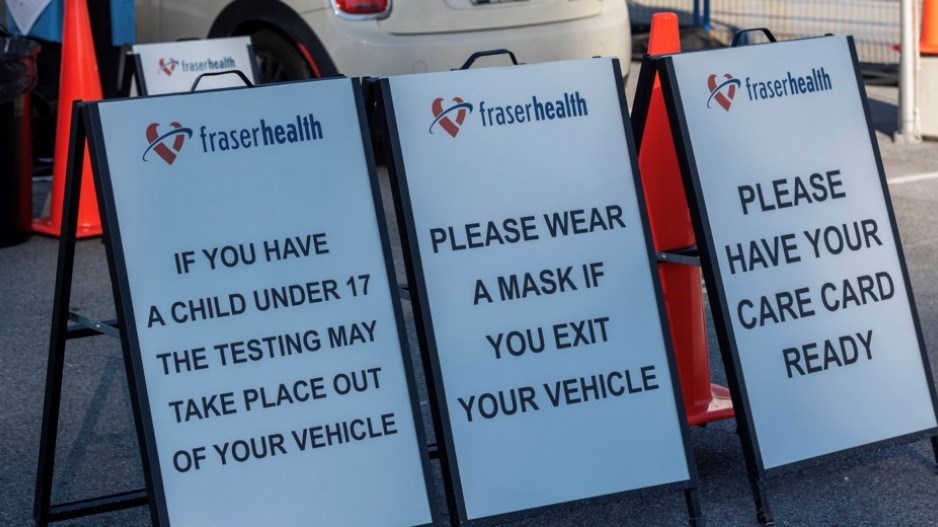More evidence mounted on July 21 that B.C.'s attempts to control the COVID-19 pandemic are finding resistance.
For the second day in a row, the province reported a higher number of new COVID-19 infections, with the 78 known new cases being the highest total since the 87 new cases reported four weeks ago,on June 23.
Back then, health officials were excited that the province had gone five consecutive days with fewer than 100 new cases.
The province has since, however, reached a low of 20 new cases in a day, on July 5, and the province's relaxed restrictions mean many people have been legally having large house parties, have gone to nightclubs and have gone shopping without wearing masks.
The province did not reveal how many of the new infections are in people who have not been vaccinated.
Vaccination campaign continues
B.C.'s vaccination effort continues at a steady pace of more than 60,000 doses provided per day.
In the past day, another 5,270 British Columbians received their first dose of vaccine, while 58,223 others received second doses necessary to be considered fully vaccinated.
In total, the province's count is that 3,711,930 British Columbians have received at least one dose of vaccine. All of those are aged 12 years or older, as vaccines are not yet approved for those who are younger than 12 years.
The B.C. government said that 80.1% of B.C.'s eligible population has been vaccinated with at least one dose, so that means that it believes the province has about 4,634,119 residents who are at least 12 years old. It added that 2,577,909 British Columbians have received needed second doses. That amounts to about 55.6% of the eligible population.
The B.C. government's most recent estimate of the province's total population is 5,147,712, so that means that about 72.1% of B.C.'s total population has had at least one dose of vaccine, and just over 50% of the province's total population has had two doses.
B.C. has provided at least one dose of vaccine to 3,507,707 British Columbians who are at least 18 years old. Of those, 2,552,325 have had second doses of vaccine. The province calculates that this translates into 81.1% of that age group having had their first dose of vaccine, and 59% of that age group having had two doses.
In addition to these doses, the B.C. government has provided a total of 7,310 doses of vaccine to people who either normally do not live in B.C., or to British Columbians who have since died, according to provincial data. This brings the total number of vaccine doses administered in the province to 6,297,149.
New cases disproportionately in B.C.'s Interior
The 78 newly discovered COVID-19 infections continue to be appearing disproportionately in the comparatively less populated Interior Health region, where wildfires are raging, and many have been told to evacuate their homes.
BC Centre for Disease Control data shows towns with large spikes in the Interior region include Castlegar and Summerland. In Castlegar, officials detected 18 COVID-19 cases in the week that ended on July 19, compared with four cases the previous week. In Summerland, officials detected 11 COVID-19 cases in the week that ended on July 19, compared with one case the previous week.
Conversely, Grand Forks' outbreak showed signs of easing. It reported four new cases in the week that ended July 19, compared with 29 cases the previous week.
By health region, the 78 new cases include:
• 21 in Fraser Health (26.9%);
• 23 in Vancouver Coastal Health (29.5%);
• 31 in Interior Health (39.7%);
• one in Northern Health (1.3%);
• two in Island Health (2.6%); and
• no one who normally resides outside B.C.
More than 98.3%, or 146,142, of the 148,641 people known to have contracted COVID-19 in B.C. are considered by the province to have recovered because they have gone 10 days after first feeling symptoms, and are therefore thought to not be infectious.
The recent rise in new cases has been pushing up the number of those with active infections. There are now 729 people known to be actively battling COVID-19 infections in the province. That count has not been higher since June 30, when there were 816 British Columbians known to be battling COVID-19.
B.C.'s 729 active infections, by health region, include:
• 198 in Fraser Health (27.1%);
• 255 in Vancouver Coastal Health (35%);
• 222 in Interior Health (30.5%);
• 30 cases in Northern Health (4.1%);
• 18 in Island Health (2.5%); and
• six people who reside outside B.C.
B.C. had been doing well at reducing the number of new cases detected each day, and totals now are considerably below where they were a couple months ago.
This is why, by some metrics, the province continues to see improvement. The number of COVID-19-infected patients in B.C. hospitals fighting for their lives has declined to 48 – the lowest number since September 10, when there were 42 people in B.C. hospitals with those infections. Of those now in B.C. hospitals with COVID-19, 16 are in intensive care units.
Other good news is that there were no known COVID-19-related deaths in B.C. for the second consecutive day. There have been nine COVID-19 deaths so far in July, and a total of 1,763 since the first COVID-19 death in B.C., and in Canada, was identified on March 9, 2020 – a man in his 80s who lived at North Vancouver's Lynn Valley Care Centre.
The two known outbreaks at B.C. healthcare facilities are at:
• the long-term care centre Holyrood Manor in Maple Ridge, in Fraser Health; and
• Laurel Place at Surrey Memorial Hospital in Fraser Health.




